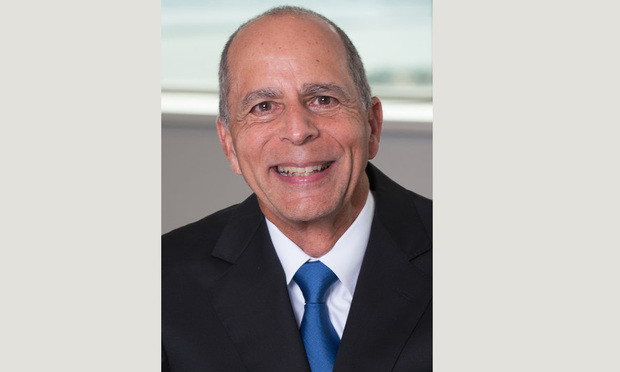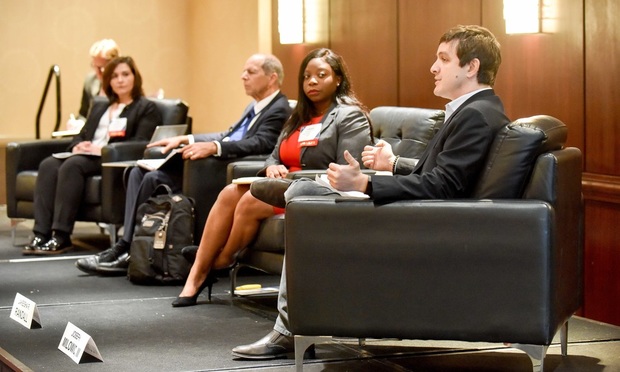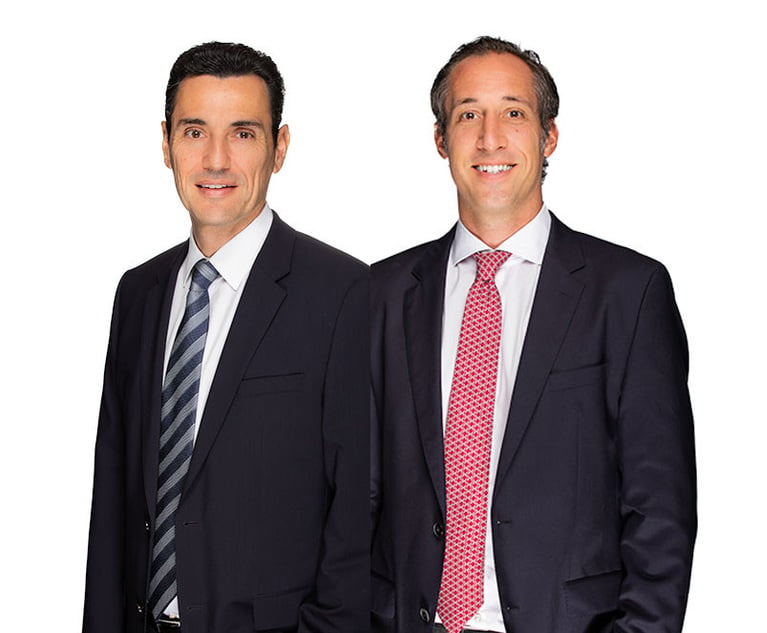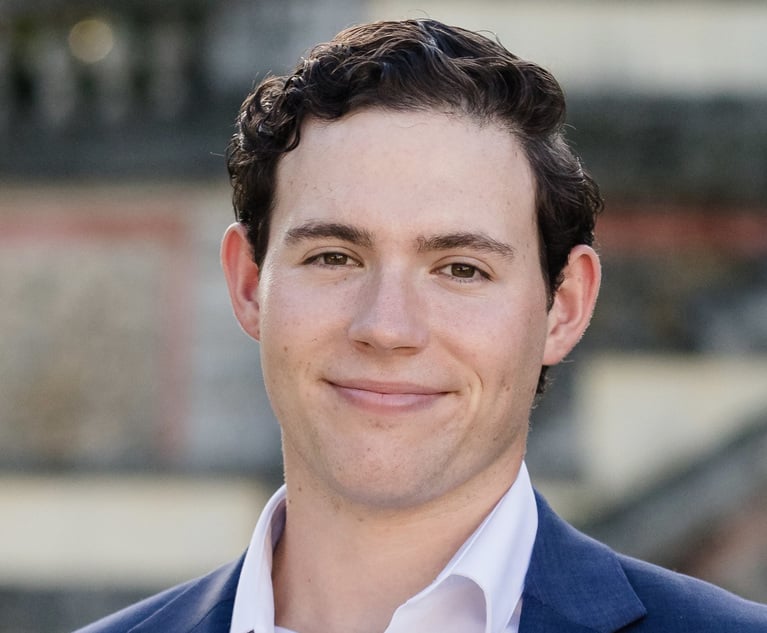When Do You Have an Ethical Duty to Report a Mentally Ill Lawyer?
Miami attorney John Barkett prepared a report on ethical quandaries for an American Bar Association panel discussion.
May 03, 2019 at 01:25 PM
5 minute read
The original version of this story was published on New York Law Journal
 John Barkett, Shook, Hardy & Bacon
John Barkett, Shook, Hardy & Bacon
Your partner has a heart attack and the first thing you do is inform the attorney discipline committee because you're sure he can't be as strong an advocate with a weakened heart. Absurd. Right?
Then when would it be necessary to turn in a colleague who is depressed? What if she is an alcoholic or a drug abuser and can't be counted on to safeguard client information if she blacked out? What if he is suicidal and you worry that reporting him might prompt him to kill himself?
These were the questions an American Bar Association panel grappled with in a discussion titled “Balancing a Lawyer's Cry for Help from Dependency or Depression with Ethical Obligations of Competence and Reporting.” The panel dealt with the thorny issue of when a lawyer crosses from mental illness to impairment and should withdraw from cases.
Joseph Milowic III, a Quinn Emanuel Urquhart & Sullivan partner who revealed his struggles with depression a year ago, was a member of the panel. He introduced the heart attack analogy to suggest lawyers who are mentally ill should be treated the same as those with physical illnesses.
“I think it's important that we dispel any notion that we have to report any of our colleagues just because he comes to you with a mental health issue,” Milowic said. “That should not be the perception.”
Some of the country's most prominent lawyers at the top of their game struggle with mental illness, said Milowic, founder of the Lawyers Depression Project, a peer-to-peer mental health support group that chats online and by phone twice a week.
 From left, moderator Richard Gaal, a partner at McDowell Knight; Diana Uchiyama, executive director, Illinois Lawyers' Assistance Program; John Barkett, a partner at Shook, Hardy & Bacon; LaKeisha Randall, a trial attorney at Bey & Associates; and Joseph Milowic III, a partner at Quinn Emanuel, talk about mental illness at an ABA conference. Photo: David Handschuh
From left, moderator Richard Gaal, a partner at McDowell Knight; Diana Uchiyama, executive director, Illinois Lawyers' Assistance Program; John Barkett, a partner at Shook, Hardy & Bacon; LaKeisha Randall, a trial attorney at Bey & Associates; and Joseph Milowic III, a partner at Quinn Emanuel, talk about mental illness at an ABA conference. Photo: David Handschuh“Lawyers with a well-being impairment may be, under certain circumstances, at greater risk of losing one of these devices or leaving them somewhere where they may not be recovered,” attorney John Barkett said in a report he prepared for the discussion.
Barkett, a Miami partner at Shook, Hardy & Bacon and a member of the ABA standing committee on ethics and professional responsibility, said it's clear a lawyer who commits misconduct has to be reported. What's less clear is when a lawyer's impairment in itself is enough to warrant reporting if the lawyer fails to withdraw from assignments. Barkett said he never faced such a situation in his 45 years of practice.
Richard Gaal, co-chair of the Mental Health and Wellness Task Force for the ABA and a partner at McDowell Knight Roedder & Sledge in Mobile, Alabama, recounted how he realized he was an alcoholic at a lawyers convention in New Orleans.
“As a young lawyer, I very much loved the idea of work hard, play hard,” he said. “And New Orleans was one of my favorite places to play.”
But when he blacked out during the trip, he came to the conclusion he had a problem. He felt he was operating at a “pretty high threshold,” but looking back he realizes he could have been a much better lawyer. Gaal, who moderated the panel Thursday, has been sober since 2010.
Gaal said some of his colleagues didn't even realize he was a problem drinker. Perhaps that's no surprise, considering the prevalence of such behavior in the legal profession. In the 2016 study on lawyer well-being, the Hazelden Betty Ford Foundation and the ABA Commission on Lawyer Assistance found more than 22 percent of the nearly 13,000 working lawyers surveyed had problems with alcohol or drug use.
Gaal didn't do anything in his alcoholic haze that endangered clients. But what would have happened, for instance, if Gaal or any other impaired lawyer lost an electronic device with sensitive client information while blacked out?
Diana Uchiyama, executive director of the Illinois Lawyers' Assistance Program in Chicago and a panel member, said she sometimes wonders whether lawyers join the profession with such high rates of mental illness or develop it on the job. Lawyers are often perfectionists and pessimists, two qualities that lead to depression and anxiety, she said.
While she acknowledges everyone makes mistakes, mistakes often are not acceptable in the legal profession.
Barkett described the dilemma this way: “Generally speaking, we're not supposed to be perfect, but we're not supposed to make mistakes.”
Read More:
Lawyers, Experts Fear Dire Consequences as the Pace of Legal Work Accelerates
Quinn Emanuel Partner Suffers From Depression and He Wants Everyone to Know
ABA President Sees Call to Action in Quinn Emanuel Partner's Story of Depression
This content has been archived. It is available through our partners, LexisNexis® and Bloomberg Law.
To view this content, please continue to their sites.
Not a Lexis Subscriber?
Subscribe Now
Not a Bloomberg Law Subscriber?
Subscribe Now
NOT FOR REPRINT
© 2025 ALM Global, LLC, All Rights Reserved. Request academic re-use from www.copyright.com. All other uses, submit a request to [email protected]. For more information visit Asset & Logo Licensing.
You Might Like
View All
Calif. Fires Should Serve as a Reminder to Fla.’s Commercial Landlords and Tenants Not to Be Complacent
6 minute read
The Hidden Risks and Benefits of Investing in a Condo-Hotel or Branded Condominium Unit
9 minute read
Redeveloping Real Estate After Natural Disasters: Challenges, Strategies and Opportunities
6 minute readTrending Stories
- 1States Accuse Trump of Thwarting Court's Funding Restoration Order
- 2Microsoft Becomes Latest Tech Company to Face Claims of Stealing Marketing Commissions From Influencers
- 3Coral Gables Attorney Busted for Stalking Lawyer
- 4Trump's DOJ Delays Releasing Jan. 6 FBI Agents List Under Consent Order
- 5Securities Report Says That 2024 Settlements Passed a Total of $5.2B
Who Got The Work
J. Brugh Lower of Gibbons has entered an appearance for industrial equipment supplier Devco Corporation in a pending trademark infringement lawsuit. The suit, accusing the defendant of selling knock-off Graco products, was filed Dec. 18 in New Jersey District Court by Rivkin Radler on behalf of Graco Inc. and Graco Minnesota. The case, assigned to U.S. District Judge Zahid N. Quraishi, is 3:24-cv-11294, Graco Inc. et al v. Devco Corporation.
Who Got The Work
Rebecca Maller-Stein and Kent A. Yalowitz of Arnold & Porter Kaye Scholer have entered their appearances for Hanaco Venture Capital and its executives, Lior Prosor and David Frankel, in a pending securities lawsuit. The action, filed on Dec. 24 in New York Southern District Court by Zell, Aron & Co. on behalf of Goldeneye Advisors, accuses the defendants of negligently and fraudulently managing the plaintiff's $1 million investment. The case, assigned to U.S. District Judge Vernon S. Broderick, is 1:24-cv-09918, Goldeneye Advisors, LLC v. Hanaco Venture Capital, Ltd. et al.
Who Got The Work
Attorneys from A&O Shearman has stepped in as defense counsel for Toronto-Dominion Bank and other defendants in a pending securities class action. The suit, filed Dec. 11 in New York Southern District Court by Bleichmar Fonti & Auld, accuses the defendants of concealing the bank's 'pervasive' deficiencies in regards to its compliance with the Bank Secrecy Act and the quality of its anti-money laundering controls. The case, assigned to U.S. District Judge Arun Subramanian, is 1:24-cv-09445, Gonzalez v. The Toronto-Dominion Bank et al.
Who Got The Work
Crown Castle International, a Pennsylvania company providing shared communications infrastructure, has turned to Luke D. Wolf of Gordon Rees Scully Mansukhani to fend off a pending breach-of-contract lawsuit. The court action, filed Nov. 25 in Michigan Eastern District Court by Hooper Hathaway PC on behalf of The Town Residences LLC, accuses Crown Castle of failing to transfer approximately $30,000 in utility payments from T-Mobile in breach of a roof-top lease and assignment agreement. The case, assigned to U.S. District Judge Susan K. Declercq, is 2:24-cv-13131, The Town Residences LLC v. T-Mobile US, Inc. et al.
Who Got The Work
Wilfred P. Coronato and Daniel M. Schwartz of McCarter & English have stepped in as defense counsel to Electrolux Home Products Inc. in a pending product liability lawsuit. The court action, filed Nov. 26 in New York Eastern District Court by Poulos Lopiccolo PC and Nagel Rice LLP on behalf of David Stern, alleges that the defendant's refrigerators’ drawers and shelving repeatedly break and fall apart within months after purchase. The case, assigned to U.S. District Judge Joan M. Azrack, is 2:24-cv-08204, Stern v. Electrolux Home Products, Inc.
Featured Firms
Law Offices of Gary Martin Hays & Associates, P.C.
(470) 294-1674
Law Offices of Mark E. Salomone
(857) 444-6468
Smith & Hassler
(713) 739-1250







